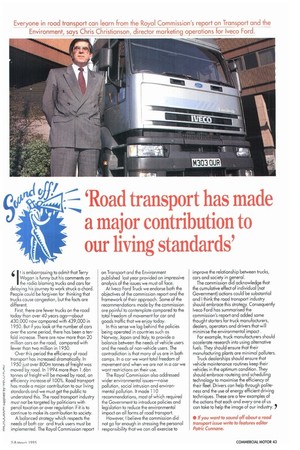'Road transport has made
Page 45

If you've noticed an error in this article please click here to report it so we can fix it.
a major contribution to our living standards'
6 t is embarrassing to admit that Terry
I Wagon is funny but his comments on the radio blaming trucks and cars for delaying his journey to work struck a chord. People could be forgiven for thinking that trucks cause congestion, but the facts are different.
First, there are fewer trucks on the road today than over 40 years ago—about 430,000 now compared with 439,000 in 1950. But if you look at the number of cars over the same period, there has been a tenfold increase. There are now more than 20 million cars on the road, compared with fewer than two million in 1950.
Over this period the efficiency of road transport has increased dramatically. In 1950 just over 800m tonnes of freight was moved by road. In 1994 more than 1.6bn tonnes of freght will be moved by road, an efficiency increase of 100%. Road transport has made a major contribution to our living standards and we must get the public to understand this. The road transport industry must not be targeted by politicians with penal taxation or over regulation if it is to continue to make its contribution to society. A balanced strategy which respects the needs of both car and truck users must be implemented. The Royal Commission report on Transport and the Environment published last year provided an impressive analysis of the issues we must all face. At lveco Ford Truck we endorse both the objectives of the commission report and the framework of their approach. Some of the recommendations made by the commission are painful to contemplate compared to the total freedom of movement for car and goods traffic that we enjoy today. In this sense we lag behind the policies being operated in countries such as Norway, Japan and Italy, to provide a balance between the needs of vehicle users and the needs of non-vehicle users. The contradiction is that many of us are in both camps. In a car we want total freedom of movement and when we are not in a car we want restrictions on their use.
The Royal Commission also addressed wider environmental issues—noise pollution, social intrusion and environmental pollution. It made 110 recommendations, most of which required the Government to introduce policies and legislation to reduce the environmental impact on all forms of road transport. However, I believe the commission did not go for enough in stressing the personal responsibility that we can all exercise to improve the relationship between trucks, cars and society in general.
The commission did acknowledge that the cumulative effect of individual (not Government) actions could be substantial and I think the road transport industry should embrace this strategy. Consequently lveco Ford has summarised, the commission's report and added some thought starters for truck manufacturers, dealers, operators and drivers that will minimise the environmental impact.
For example, truck manufacturers should accelerate research into using alternative fuels. They should ensure that their manufacturing plants are minimal polluters. Truck dealerships should ensure that vehicle maintenance routines keep their vehicles in the optimum condition. They should embrace routeing and scheduling technology to maximise the efficiency of their fleet. Drivers can help through politeness and the use of energy efficient (driving techniques. These are a few examples of the actions that each and every one of us can take to help the image of our industry.




























































































